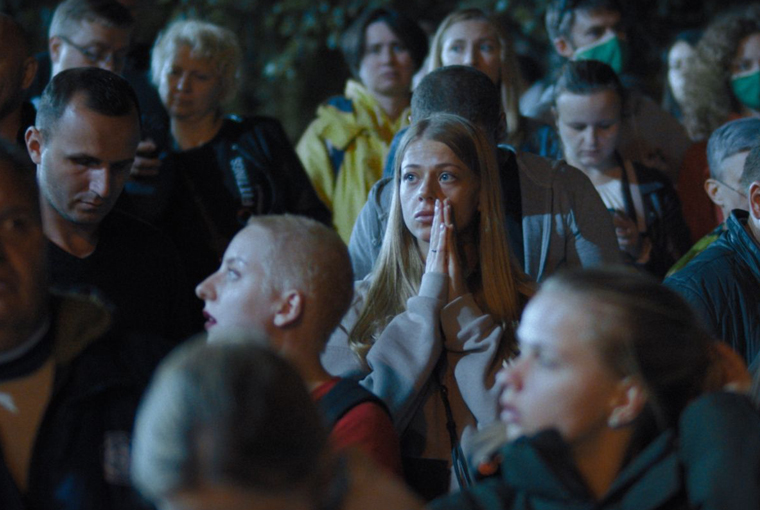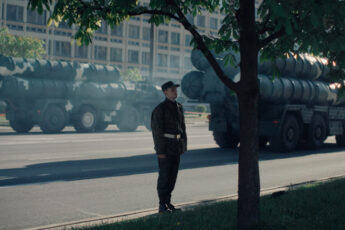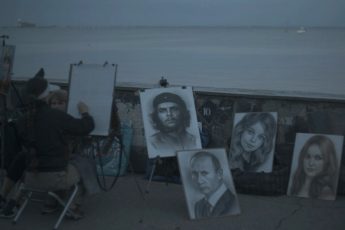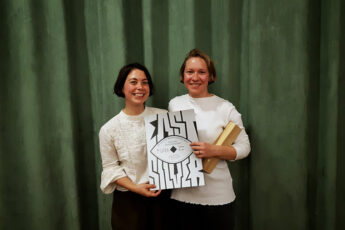Subterranean Explosion
Aliaksei Paluyan’s Courage (2021)
Vol. 116 (Summer 2021) by Colette de Castro
ROS: We could play at questions.
GUIL: What good would that do?
– Rosencrantz and Guildenstern Are Dead (dir. Tom Stoppard, 1966)
In the sixteen years since the Belarus Free Theater was founded in March 2005, their activities have been documented by various news outlets and filmmakers throughout the world. Extensive video reports have been made by the likes of Al Jazeera and the Guardian, and there are two documentaries about them: Dangerous Acts Starring the Unstable Elements of Belarus Free Theatre from 2013, and Acting for Freedom: the Battle of the Belarus Free Theater from 2015. Courage is the latest item in the wealth of filmic and journalistic attention garnered by this group. And what’s not to find fascinating? Charismatic and impassioned actors who are willing to go all out for their art, performances that take place in secret, exiled theater directors, and astounding plays make for material that is easy to sell.
Previous portraits have been serious accounts of the work of this theater company. The 2009 Al Jazeerra reportage1 deals with its founding, what they choose to perform and the everyday (yet fascinating) administration of the theater. At the time the report was being made, the founders were yet to be exiled from the country. At this point in time, the group was young and enthusiastic, perhaps more hopeful for the future than ever again.
Friedemann Hottenbacher’s documentary Acting for Freedom, made six years later (2015), details the double life of the group in London and Minsk, focusing on the shows in London. By this time, the founders of the project, Nikolai Khalezin and Natalia Koliada, had been exiled in London, and the high profile the group had garnered came with both recognition and danger. As a movement, the Belarus Free Theater had been turning into a byword for rebellion against the repressive government in that country. Celebrities like Tom Stoppard, Vaclav Havel, Stephen Fry and Hugh Grant have endorsed the group and spoken out to support them in their protest against the government and its alleged interference in the elections. In London, the Free Theater performances brim with energy and life; performers jump and fly across the stage, making the most of the large and well-lit spaces they’ve been offered. Theirs is a relentlessly physical theater, and countless possibilities are unleashed with these infrastructural means. In Minsk, by contrast, they operate in a darker, more intimate theater space, the threat of police interference hanging over every performance. But footage from their home productions shown in Acting for Freedom illustrates that the level of investment by both the audience and the performances lends a powerful sense of urgency to the show – something that cannot be mimicked or reproduced, whatever the technical possibilities.
The plays of the Belarus Free Theater are often singular creations, based on the work of playwrights such as Tom Stoppard, Harold Pinter, and Sarah Kane. The Value of Money, performed in London in 2015, was partially based on the Stoppard play quoted from above, Rosencrantz and Guildenstern Are Dead, in which the two main characters ask each other questions, turning the inquisitive to-and-fro into a game the rules of which are complicated and sardonic. The most important thing about the game, however, is that you mustn’t ever answer any of the questions. Acting for Freedom – perhaps despite itself and its desire to portray the Free Theater in a positive light – ponders whether a theater company is enough to spark a strong and steady protest movement in a country where most people have trouble realistically envisioning a democratic future.
Filming for the first documentary about the group to be made by a Belarusian, Courage, began in the two years leading up to the August 2020 elections, and went on to cover the events that followed the controversial reelection of Alexander Lukashenko. While the aforementioned documentaries were made from the outside, looking in, here the audience find themself right in the middle of the fray. Initially following three of the Free Theater actors, the film quickly moves away from being exclusively focused on them, and instead moves to the protests of August 2020. It seems that over the years a certain level of bitterness has installed itself in the hearts of some of the actors. Pavel, one of the main actors from the ensemble, regretfully declares that it’s not the time for theater anymore, which is too passive, but about going out on the street and shouting protest slogans directly at the country’s leaders.
Straight-backed and serious, the documentary’s creator Aliaksei Paluyan left his native Belarus as a student to study mathematics and film in Germany. As a teenager he had attended one of the Free Theatre’s performances and decided he would closely follow the company throughout his years away, eventually traveling back to make this film starting in 2018. When we met, he explained to me that he had to change the DoP half-way through the shoot. As the protests heated up, he switched from his German DoP, Jesse Mazuch (known for working with Sergei Loznitsa on films like Victory Day), to Belarusian Tanya Haurylchyk. He thought she would better understand and capture the atmosphere if things were to get really dangerous. His intuition turned out to be justified. The beginning of the film is clearly marked by Mazuch’s dogged, but revealing camerawork, which intimately displays the extravagant Soviet murals from the 60s and 70s that line the huge boulevards of Minsk. Once the election results are announced and protests ramp up, the style changes rapidly, as we are witness to the heartbeat of the Belarusian underground that is soon released upwards onto the streets at night. Thus, the change in camerawork mirrors the situation in Belarus, where resistance stayed hidden away from sight until it finally exploded onto the streets.
In several lucid passages which follow these protests, Haurylchyk’s camera cleverly captures the energy of a repressed crowd – how it rises and falls, calms then roars, like waves in a restless sea. One flailing moment can completely change the energy on the battle lines; it can uplift and then make everyone break into applause or shouts, or subdue them into fear and terror once again. This energy continues not only during the protests, but the following days too, as parents and families wait outside the prisons to try and get information about those who have been detained. People gather around in main squares to pay homage to those who have died in the protests, chanting “thank you” to a protestor who had died the day before. Old ladies walk through the city with linked arms, holding flowers. One of them politely asks a police officer who is filming them why they are filming: “This is not a prison camp, dear boy”.
In one closely observed scene, a policeman puts a bunch of white flowers into a window of his riot shield to show he supports the protestors. The crowd go wild. They begin chanting, tentatively approaching and then hugging him. The whole time, the camera rests steadily on the window to his face – the unprotected eyeline of his balaclava -, his eyes looking at once proud and terrified. Thus, the film opens up whole worlds to us, through subtle camera action and shallow focus.
Though none of the documentaries made about the Belarus Free Theater have equaled the brilliance of politically minded documentarians such as Sergei Loznitsa, they are valuable documents from the frontline. With a brave and international crew, Aliaksei Paluyan’s Courage bears witness to a powerful and unstoppable movement. The small rebellions carried out by old women with flowers, single policemen expressing their solidarity with the protests, and individuals filming with their cellphones, may seem paltry in the face of so much brutal power; but these images are solid proof of an ever-thriving rebellion in Belarus.
References
- 1.`Witness – Free Theatre of Belarus – Part 1’. https://www.youtube.com/watch?v=o_b1zRxinmA&ab_channel=AlJazeeraEnglish [Accessed on August 4th 2021].




Leave a Comment